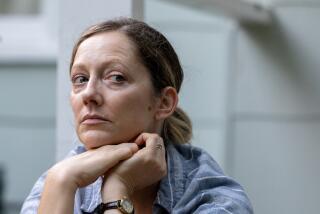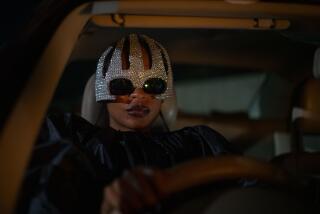Review: ‘The Innocents’ strikingly tells of what befell a convent victimized during WWII
- Share via
“The Innocents” soars above its seeming contradictions.
A gripping psychological drama based on events more than half a century old, it has inescapable contemporary echoes. Laced with intensely emotional situations, it refuses to force the issue by pushing too hard. And it proves, yet again, that though moral and spiritual questions may not sound spellbinding they often provide the most absorbing movie experiences.
Directing and co-writing this compelling Franco-Polish story of the nature of belief and the way war collapses the gap between the sacred and the profane is veteran French filmmaker Anne Fontaine. Best known recently for films like “Coco Before Chanel” and “The Girl From Monaco,” Fontaine returns here to the tauter style of earlier works like “How I Killed My Father” and 1997’s “Dry Cleaning.”
Inspired by the journal notes of Madeleine Pauliac, a young French Red Cross doctor who worked in Poland at the end of World War II, “The Innocents” (which was called “Agnus Dei” when it debuted at Sundance) has quite a story to tell, and in Fontaine (who shares writing credit with Pascal Bonitzer, Sabrina B. Karine and Alice Vial) it has a director who knows precisely how to tell it.
“The Innocents” is set in December 1945, six months after the end of the European war, in a Poland occupied by Russian troops. It begins quietly, in a Benedictine convent during one of the community’s seven daily sung prayer sessions. These sounds are pure and transporting, and the film returns to them frequently to counterpoint the ugliness that defines the outside world.
Suddenly, a woman screams, again and again. The nuns do not react, they’ve clearly heard it before, but when prayer is over a novice sneaks out and takes a long journey on foot to a nearby town in search of a doctor who is not Polish and definitely not Russian.
Almost by chance the novice is directed to Mathilde (Lou de Laage), a French Red Cross doctor in the country to aid wounded French soldiers.
Very reluctantly, Mathilde is convinced to return to the convent, where she meets the French-speaking Sister Maria (Agata Buzek) and the convent’s iron-willed Mother Abbess (Agata Kulesza, the Communist aunt in “Ida”) and hears a horrifying story.
Occupied by Russian soldiers near the end of the war, the convent was the site of multiple rapes, which resulted in more than half a dozen nuns becoming pregnant. These women are in great need of medical attention they cannot get from Polish doctors because exposure would likely mean the closure of the convent and shame for the individuals involved.
Even providing medical treatment is difficult because the nuns’ vows discourage physical contact and revealing the body, even to a female doctor, and the threat of renewed attacks by soldiers is ever present. And that is not the half of it.
For the inconceivable nightmare that has happened to these women affects their faith in any number of different ways. Reactions include shame, denial, hysterics and fear of damnation with comments ranging from “we’re in the hands of Providence” to “I don’t want to go to hell.”
For her part, Mathilde, the only doctor the Mother Abbess will allow inside, has difficulties of her own to face. She has to hide what she is doing from her superiors at work, deal with any number of crises her convent visits precipitate and figure out her own feelings about Samuel (Vincent Macaigne), the cynical French Jewish doctor whose parents died in the Bergen-Belsen concentration camp.
In addition to its very dramatic narrative thrust about the fate of the nuns, “The Innocents” explores a number of compelling moral issues, including the nature of faith, the competing demands of motherhood and religion, what do God and morality require, and how do fallible people interpret those demands?
Strikingly acted by all concerned (especially De Laage and her two Polish costars), impeccably put together by Fontaine without any false steps, “The Innocents” is also wonderfully lit, with frequent convent scenes invariably reminiscent of Italian Renaissance paintings.
Creating those luminous images was cinematographer Caroline Champetier, who also shot Xavier Beauvois’ marvelous film of monks in crisis, 2011’s “Of Gods and Men.” If there were still repertory house double bills, these two would make a splendid package.
===
‘The Innocents’
In French, Polish and Russian with English subtitles
MPAA Rating: Not rated.
Running time: 1 hour, 55 minutes. Playing Landmark, West Los Angeles.
Critic’s Choice. “The Innocents.” Anne Fontaine’s post-World War II drama involving a Polish convent and a French female doctor proves yet again that though moral and spiritual questions may not sound spellbinding, they often provide the most absorbing movie experiences. — Kenneth Turan
More to Read
Only good movies
Get the Indie Focus newsletter, Mark Olsen's weekly guide to the world of cinema.
You may occasionally receive promotional content from the Los Angeles Times.










